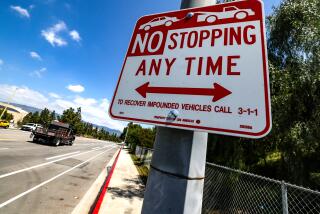Parking on Campus Calls for That Old College Try
- Share via
The hot topic on college campuses? Forget affirmative action, academic freedom or grade inflation. What really excites students these days is trying to find a parking spot.
With more undergraduates bringing cars to campus, students are getting irked over costly permits and parking violations. Schools reap millions of dollars from fees and fines, but must deal with traffic congestion and complaints.
“Anybody will tell you that parking is the No. 1 issue on campus,” said Aaron Flint, president of the Associated Students of the University of Montana, whose car was towed on his first day of class because he parked in a reserved spot. “But it’s also the No. 1 issue that’s hardest to deal with and the hardest to find solutions for.”
The problem is a matter of supply and demand: too many cars, too few spaces. The University of Arkansas, for instance, issues nearly 14,000 student and staff parking permits for 8,300 spaces.
It also collects $2 million annually in parking revenues, split evenly between permit fees and violation penalties, said Gary Smith, director of parking and transit.
Smith, who is also secretary of the 80-member Midwest Campus Parking Assn., blames the squeeze on an influx of undergraduate drivers. Two decades ago, about 30% of Arkansas freshmen brought cars to campus. Today, nearly 70% have cars, he said.
Even more problematic, he added, is that some upperclassmen bring two cars to campus.
“On the Fayetteville campus, we have a lot of permits we basically consider a license to hunt,” Smith said. “Register your car and if you can find a legal space by that permit designation, you can park there.”
Campus parking managers say the situation is only exacerbated by class schedules that create rush hours.
“It would be great if the people who teach a class, and the people who take a class, and the people who decide when classes are offered” realized that they all need places to park -- and thought about staggering class times, said Beth Glaus, manager of parking and transit at Southeast Missouri State University in Cape Girardeau.
At the urging of its student government, Southeast Missouri this year instituted a weighted lottery system that gives students who have accumulated the most credit hours the best crack at prime parking places.
Auburn University in Alabama has about 10,300 spaces for 18,000 student, faculty and staff permits.
Matt Collins, a fifth-year senior, said that when a student walks into a parking lot at Auburn, a car usually follows him or her to get the spot. “That tells you how bad it is,” he said.
Dave George, Auburn’s director of transit and parking, said the school has added several new buses and routes to its mass transit system, increasing ridership by 50% so far this year. For students reared in suburban car cultures, “it’s definitely an unusual way to get around,” he said.
The other solution to easing the crunch -- adding more spaces -- is not always cost efficient, said Quentin Moses, director of parking services at Cal State San Bernardino.
That’s especially true if open land is at a premium and schools have to build up. A space in a new multilevel parking garage costs $13,000 to build and maintain, compared to $2,000 per space in a conventional parking lot, Moses said.
Across the country, students who ignore parking tickets put their work in the classroom at risk. Parking penalties range from expulsion to a degree deferred until they make good on their debt to the parking office.
Thanks to some “good excuses” and a compassionate parking appeals court, nearly half of the 30 parking violations that senior Matt Zimmerman has racked up at the University of Wisconsin Oshkosh have been tossed out.
But getting all those tickets was so annoying that Zimmerman -- president of the Oshkosh Student Assn. -- is working with administration officials to alleviate the school’s parking woes.
“By the end of three years,” he said, “everybody should have a place to park.”
More to Read
Sign up for Essential California
The most important California stories and recommendations in your inbox every morning.
You may occasionally receive promotional content from the Los Angeles Times.










